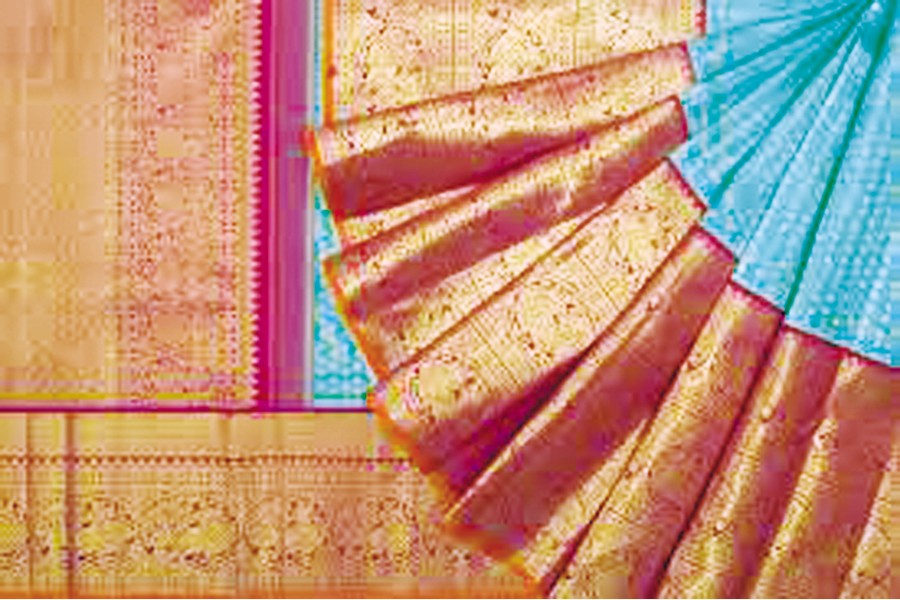
Published :
Updated :

The news that India has given Tangail Saree the Geographical Indication (GI) recognition has naturally stirred up a hornet's nest. Whatever may be the legal loopholes for India doing so, no answer can satisfy the simple fact. The fact is that Tangail is not in India. It is in Bangladesh and the artisans in that district have been producing a type of cotton saree unique in pattern and texture. The saree bears the name of the place since before it became a district in 1969. Like muslin, the finest cloth human hands have ever produced, Tangail has seen the excellence of craftsmanship unmatched by any in the whole world.
The World Intellectual Property Organisation (WIPO) clearly spells out how a product qualifies for GI recognition. It is a sign used on a product to mark a special geographical origin, its qualities and reputation attributable to that origin. In the very title Geographical Indication, this meaning is quite expressive. India has no right to claim that Tangail is its territory, so cannot do so in case of a product that has been traditionally the particular place's own. By the way the infringement is in case of both territorial integrity and the resourcefulness of traditional knowledge, skill and craftsmanship.
If India can claim Tangail saree their own, Bangladesh can as well claim the GI recognition for world famous Kanjeevaram or Kanchipuram silk saree produced in a town called Kanchipuram of Tamil Nadu. Will it be to the liking of the artisans who have been carrying the rich legacy of this exquisite saree for at least 400 years? Neither will the Indian government be pleased with such a naive but outrageous move. Indeed, the authorities in India responsible for granting GI recognition to Tangail Saree has been ill advised.
There is no way of identifying a place by the name Tangail in India just like the Kanchipuram of Tamil Nadu or Mysore Slik of Mysore or Baluchari of Murshidabad and Bishnupur cannot be identified as places in Bangladesh. The Indian government would do well to rescind the GI recognition of the Tangail Saree. Bangladesh has the inalienable right to this particular saree and no one can take away that right from this country.
There are complications in any litigation involving disputes over a GI commodity. It would be better if India realised its mistake and made the necessary move to correct it in the spirit of the friendly relations between the two neighbouring countries. India will neither gain a lot by receiving the GI recognition for a product that is not its own nor lose anything either if it surrenders its misplaced claim to the product. If there is any such product in Nadia and Shantipur of West Bengal, they can give GI recognition by that name. No harm in sticking to the place of origin and exploring the commercial viability of the product.
The artisans in Tangail have developed the craftsmanship for generations and they are struggling to survive because of numerous constraints. Yet the weave their dreams in the tapestry of fabric on the space of a few metres. This is so exquisitely designed and furnished that artisans of anywhere else including those of Pabna cannot replicate their creation. The artisans are so dexterous in doing so that the sarees from Tangail have been enjoying a great demand from home and abroad. In whichever continent or country Bangalee women live, they love to collect Tangail sarees.
Bangladesh has by this time obtained GI recognition for 31 products and 12 more are under consideration. Hopefully no other product will raise such a stormy controversy. There are more candidates for GI recognition. If Bogura curd or yoghurt deserves GI recognition, so can the highly acclaimed Gournadi dadhi (yoghurt). In equal measures, sweetmeat such as rasogolla, kalojam and rajbhog made in Gournadi can claim their specialty. These special and unique varieties of sweetmeat can as well be considered for GI recognition. Then there is patali gur (molasses cake) made from date juice in Mostafapur under Madaripur, which is far superior to any of its kind. This product also deserves GI recognition. Let there be a concerted effort to give local products the recognition they deserve because such a recognition encourages the dying art to get a fresh lease of life.


 For all latest news, follow The Financial Express Google News channel.
For all latest news, follow The Financial Express Google News channel.